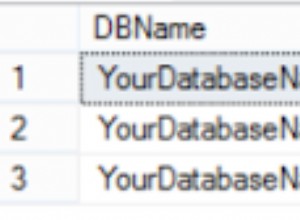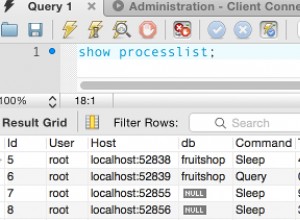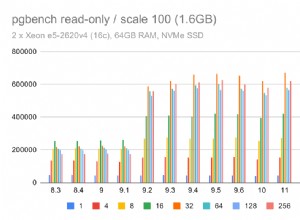Passei algum tempo e finalmente encontrei uma solução funcional.
Vou publicá-lo aqui para referência futura.
Solução
Primeiro de tudo, você tem três tabelas (
foo_table , bar_table , baz_table ) que estão apontando para seus users tabela por meio de chaves estrangeiras (chamadas user_id em todos os casos). Você precisará substituir os IDs armazenados nessas colunas de id para another_id . Veja como você pode fazer isso:-- We are dropping the foreign key constraint on dependant table (in other case it will prevent us from updating the values)
ALTER TABLE foo_table DROP CONSTRAINT fk_e52ffdeea76ed395;
-- Then, we're swapping values in foreign key column from id to another_id
UPDATE foo_table T SET user_id = (SELECT another_id FROM users WHERE id = T.user_id);
-- And finally we're creating new foreign key constraint pointing to the another_id instead of id
ALTER TABLE foo_table ADD CONSTRAINT fk_e52ffdeea76ed395 FOREIGN KEY (user_id) REFERENCES users (another_id) ON DELETE CASCADE;
Você precisará repetir as consultas acima para cada tabela dependente.
Depois disso, todas as tabelas dependentes apontarão para seu novo
another_id coluna. No final, só precisaremos substituir a chave primária:
-- 1. Dropping the original primary key
ALTER TABLE users DROP CONSTRAINT users_pkey
-- 2. Renaming existing index for another_id (optional)
ALTER INDEX uniq_1483a5e93414710b RENAME TO users_pkey
-- 3. Creating new primary key using existing index for another_id
ALTER TABLE users ADD PRIMARY KEY USING INDEX users_pkey
-- 4. Creating index for old id column (optional)
CREATE UNIQUE INDEX users_id ON users (id)
-- 5. You can drop the original sequence generator if you won't need it
DROP SEQUENCE users_id_seq
Você pode até mesmo descartar o
id original coluna se quiser. Espero que ajude alguém.




